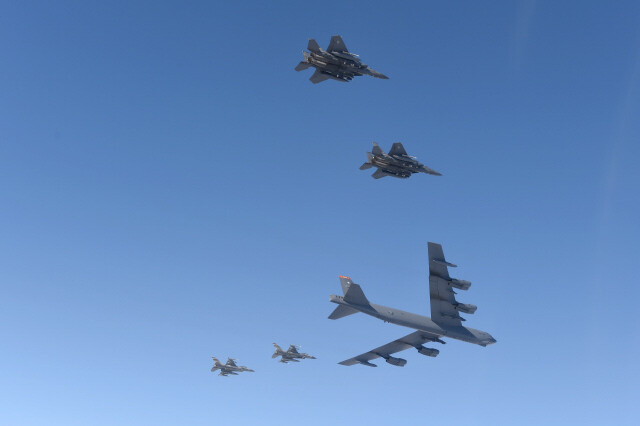hankyoreh
Links to other country sites 다른 나라 사이트 링크
B-52 flights for Joint military exercise canceled amid rising inter-Korean tensions

At the request of the South Korean government, which is concerned about rising tensions on the Korean Peninsula ahead of the North Korea-US summit, a joint South Korea-US military exercise called Blue Lightning that was supposed to involve American B-52 strategic bombers was canceled, the Wall Street Journal reported on May 18.
The newspaper quoted an anonymous American official as saying that the South Korean government had wanted to pull out of Blue Lightning because of the inclusion of B-52 bombers and that the US government had accepted the South Korean government’s request because of the importance of maintaining cooperative relations with South Korea at a sensitive diplomatic time.
According to the newspaper, the canceled exercise was separate from Max Thunder, a joint air exercise between South Korea and the US that began on May 11 and will end on May 25, though the two were supposed to take place on a similar timeframe.
The original plan was for a joint exercise between South Korea, the US and Japan that would involve 2 American B-52s deployed to Guam, as well as the Republic of Korea Air Force and the Japan Air Self-Defense Force. But because of continuing tension between South Korea and Japan, the plan was altered so that the B-52s would engage in separate exercises with the two air forces, and even the South Korea-US exercise was supposed to be minimized to avoid provoking North Korea.
But after North Korea condemned Max Thunder, South Korean Defense Minister Song Young-moo and Gen. Vincent Brooks, commander of ROK-US Combined Forces Command, met on May 16 and adjusted the plans so that the B-52 bombers would only fly through Japanese air space and not enter South Korea’s air defense identification zone. A senior official from the Defense Ministry declined to comment further on these developments.
By Yi Yong-in, Washington correspondent, and Park Byong-su, senior staff writer
Please direct comments or questions to [english@hani.co.kr]
Editorial・opinion
![[Column] Season 2 of special prosecutor probe may be coming to Korea soon [Column] Season 2 of special prosecutor probe may be coming to Korea soon](https://flexible.img.hani.co.kr/flexible/normal/500/300/imgdb/original/2024/0426/3317141030699447.jpg) [Column] Season 2 of special prosecutor probe may be coming to Korea soon
[Column] Season 2 of special prosecutor probe may be coming to Korea soon![[Column] Park Geun-hye déjà vu in Yoon Suk-yeol [Column] Park Geun-hye déjà vu in Yoon Suk-yeol](https://flexible.img.hani.co.kr/flexible/normal/500/300/imgdb/original/2024/0424/651713945113788.jpg) [Column] Park Geun-hye déjà vu in Yoon Suk-yeol
[Column] Park Geun-hye déjà vu in Yoon Suk-yeol- [Editorial] New weight of N. Korea’s nuclear threats makes dialogue all the more urgent
- [Guest essay] The real reason Korea’s new right wants to dub Rhee a founding father
- [Column] ‘Choson’: Is it time we start referring to N. Korea in its own terms?
- [Editorial] Japan’s rewriting of history with Korea has gone too far
- [Column] The president’s questionable capacity for dialogue
- [Column] Are chaebol firms just pizza pies for families to divvy up as they please?
- [Column] Has Korea, too, crossed the Rubicon on China?
- [Correspondent’s column] In Japan’s alliance with US, echoes of its past alliances with UK
Most viewed articles
- 1‘We must say no’: Seoul defense chief on Korean, USFK involvement in hypothetical Taiwan crisis
- 2N. Korean delegation’s trip to Iran shows how Pyongyang is leveraging ties with Moscow
- 3‘Weddingflation’ breaks the bank for Korean couples-to-be
- 4Korea sees more deaths than births for 52nd consecutive month in February
- 5[Editorial] New weight of N. Korea’s nuclear threats makes dialogue all the more urgent
- 6[Column] Park Geun-hye déjà vu in Yoon Suk-yeol
- 7[Column] Has Korea, too, crossed the Rubicon on China?
- 8[Guest essay] The real reason Korea’s new right wants to dub Rhee a founding father
- 9Will NewJeans end up collateral damage in internal feud at K-pop juggernaut Hybe?
- 10Why Korea shouldn’t welcome Japan’s newly beefed up defense cooperation with US